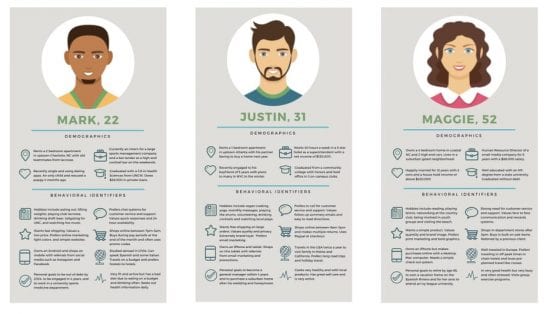I'm sorry to break it to you, but building personas will probably take twice as long as you think it will. Now's the time to create accurate personas to reap the rewards from doing so.
When thinking about personas, what comes to mind? It's likely you'll think of persona cards like the one below. But there is a lot of work involved to get to that stage - there's no point simply creating persona cards based on who you think your customers are.
Many may think it's a good idea to have a quick look at data or produce them on the assumptions of every time they've dealt with customers, but by conducting persona research you can truly understand who your customers are.
Personalization is also becoming more important, personas help you to deliver content, services, and products to relevant and targeted customers and prospects. Here's why it's worth the time and effort.
You can use personas to truly and accurately target your marketing communications
Accurate personas allow you to target specific groups of customers, for example in the UK ASDA, a major supermarket chain for years spent advertising to the "ASDA mum", this fizzled out because after all the supermarket's chain are not just mums, even if it's a core segment of their audience.
When you break down the demographics, just as many dads, students, teenagers, single millennials probably shop at ASDA. There's nothing with targeting specific groups as you may simply want to have a majority of customers from that group but it's also not a good idea to alienate an audience.
By understanding different segments you can target your advertising, whether it's online (for example display advertising, AdWords, Paid social etc) or offline (for example TV, print). If you find you have a lot of CMO's in your database you can put ads on CMO related content and online magazines. Loose personas don't allow for such targeting. For example, if you guess who you may have in your database you're missing out on potential target markets.
Download our Individual Member Resource – Persona research guide
Thinking about how you can create or improve buyer personas? Use this guide and our companion resources to create effective, actionable personas.
Access the Persona research guide
Do you know who your audience really is?
Do you really know who buys your product, when Crazyegg first launched their website heatmap tool, did they know who their customers were? UXers? Marketing managers? A combination? It's hard to say and the only way of really finding out was to conduct persona research. When I worked at UX company and platform WhatUserDo, we had the same dilemma, only persona research with members could truly reveal who customers really are - who are the ones who are the decision makers and who ultimately give sign off, they might be two very different personas.
Data and assumptions are not enough
Personas can be created using data you hold, for example, job title can be found if you ask every customer their job title, but this doesn't help you explore their needs, motivations or challenges, all of which are key to understanding your customers and producing persona cards.
By understanding the process they went through when buying from you, you'll find out who's involved and be able to delve deeply into the decision-making process. By understanding the challenges they face you'll see how your service or product fits into their life and what they need from you - an added bonus of conducting persona research.
You cna use data to understand demographics, though interviews and surveys can help update this data, and then you can use interviews with customers to understand the other elements of a persona, such as the behavioural elements.
Always create an excuse to speak directly with customers
Successful businesses spend a lot of time speaking to customers and conducting persona research is another reason to do this. "Customer closeness" might be becoming a buzzword, as is the phrase "customer-obsessed" but by spending an increased amount of time speaking to customers you'll understand far more about your customers and be able to advance your business accordingly.
In our own persona research, here at Smart Insights, we collected feedback on various member resources whilst we were interviewing members of the buying process, who was involved in that process and why Smart Insights was the solution. You'll also be able to understand why you were chosen over competitors, so there's some competitor research in there.

It's not as time-consuming and expensive as you might think
It's easy to just try and put together your personas without having conducted any research, but interviewing 10 customers for 20 minutes each isn't too time-consuming and can either be done in a week or two or over a much longer period of time. Talking to your customers should also be a regular, monthly or weekly activity.
The big supermarkets spent much time shopping with their customers, not in a mystery shopping sense, but just to keep on learning from what the customers need and want. Does being an online business, for example, mean this should be different? Absolutely not, we're all selling to customers, and we always want to know exactly who they are, so we can target those customers better in the future and win more customers.
Incentives are the most expensive element of any type of research, in terms of pure hard cost but customers still appreciate sensible incentives. Time can be taken from various members of the company too, having various people interview customers is as beneficial as having one persona research "owner".
Personas can also help with the following:
- Blog content
- Website personalization
- Marketing communications and messaging
- Email marketing and newsletters
- Tone on social media and type of content shared
The more accurate your personas, the easier the above will be.
There is no excuse whatsoever for not speaking to your customers on a regular basis.










